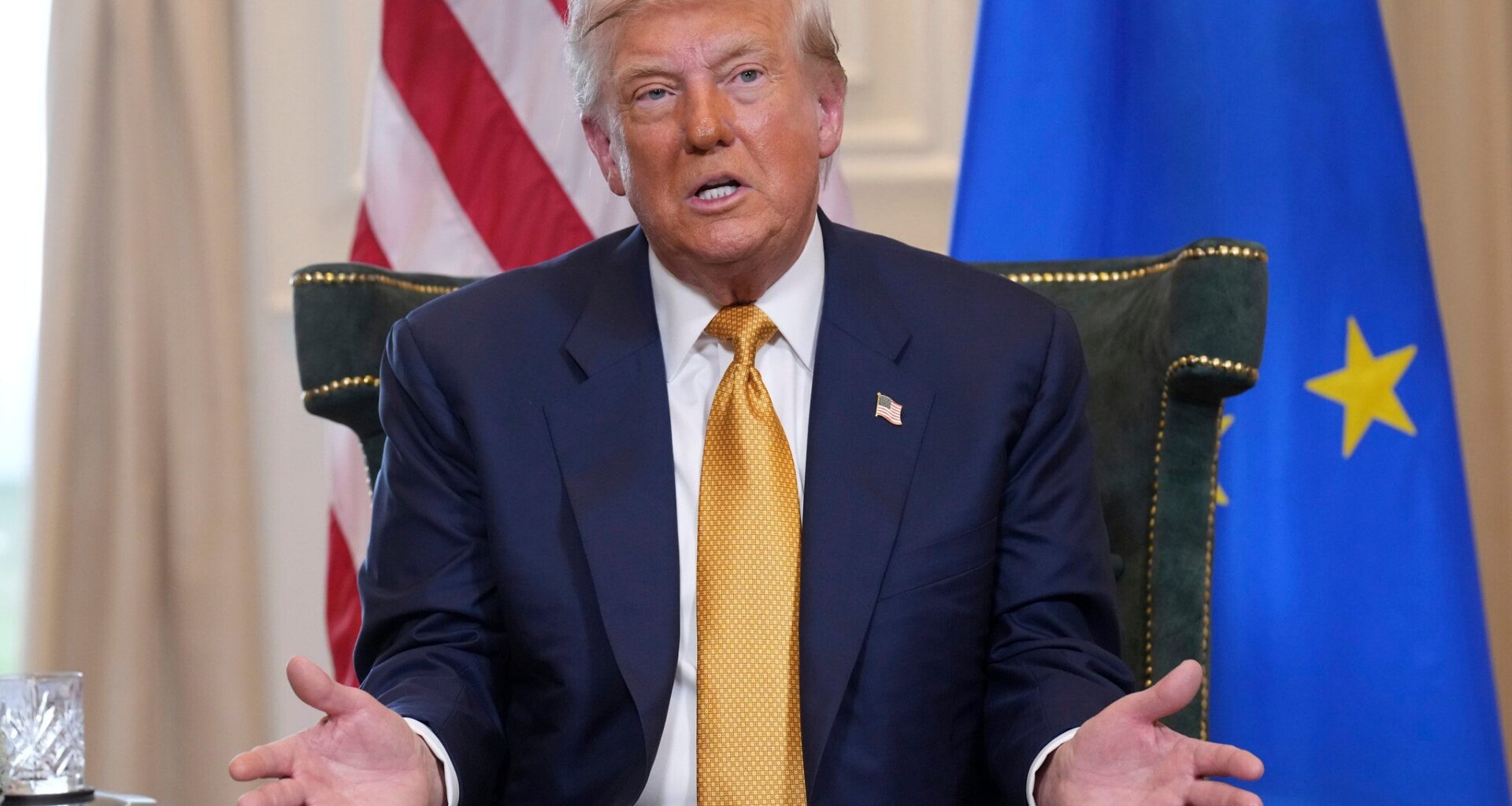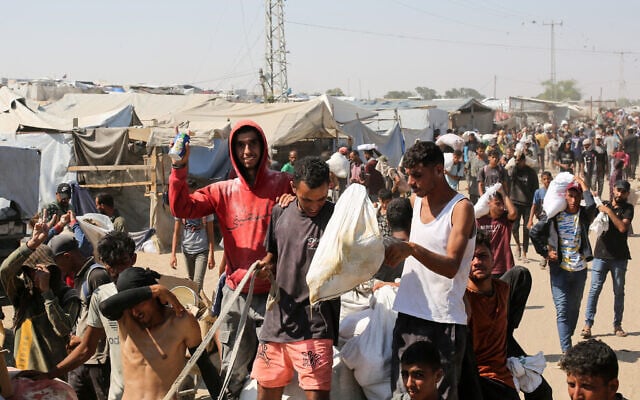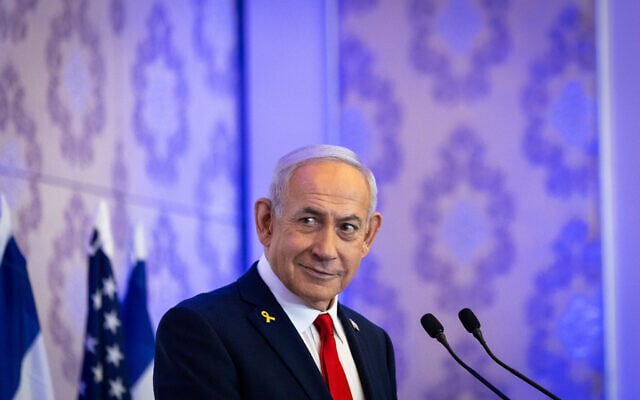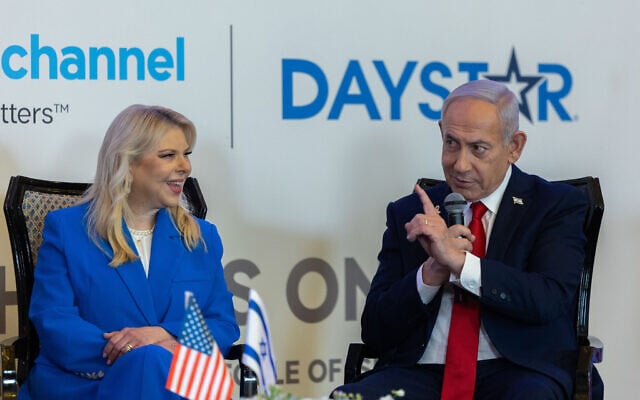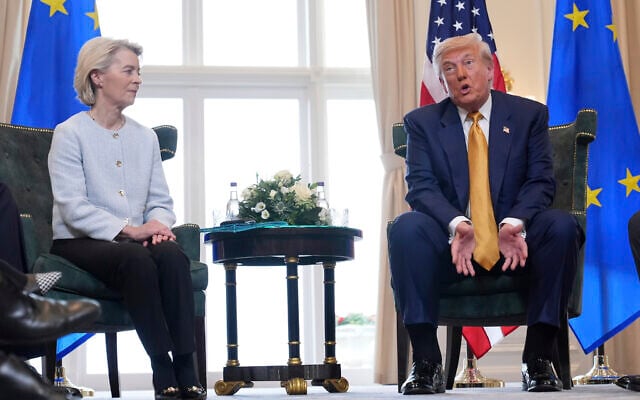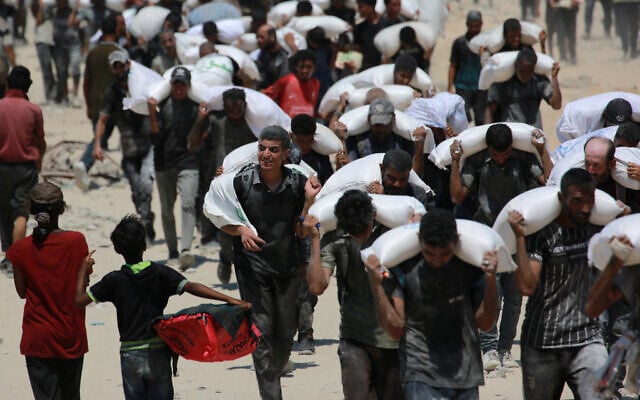US President Donald Trump said Sunday that “Israel will have to make a decision” on Gaza, as Prime Minister Benjamin Netanyahu denied Jerusalem had any part in widespread aid shortages there.
Trump, who is on a four-day visit to Scotland, was asked by a reporter about the images that have been coming out of Gaza of starving children, which he said he thought were “terrible.”
But he promptly pivoted to say, “They’re stealing the food,” without specifying who he was talking about, although he was likely alluding to Hamas, which Israel has regularly accused of stealing aid for its own benefit.
The president lamented that the US had supposedly donated $60 million to the much-maligned Gaza Humanitarian Foundation, which has taken over the distribution of aid in the Strip, while “no other country gave anything.”
“It makes you feel a little bad when you do that and, you know, you have other countries not giving anything,” he said, sitting alongside European Commission President Ursula von der Leyen. “Nobody gave but us. And nobody said, Gee, thank you very much. And it would be nice to have at least a thank you.”
Get The Times of Israel’s Daily Edition
by email and never miss our top stories
By signing up, you agree to the terms
“We’re giving a lot of money, a lot of food, a lot of everything,” he said. “If we weren’t there, I think people would have starved, frankly. They would have starved, and it’s not like they’re eating well.”
People carry food parcels and bags in the al-Mawasi camp in Rafah in the southern Gaza Strip, that were picked up from the Rafah corridor on July 27, 2025. (AFP)
The actual figure given to the GHF by the US is $30 million, and the US is also far from the only country to donate humanitarian aid. It is not even the largest donor, as the United Arab Emirates has given a larger percentage of assistance.
REPORTER: Should Israel be doing more to allow food in Gaza?
TRUMP: Say it?
REPORTER: Should Israel be doing more to allow food in Gaza?
TRUMP: What is she saying?
SOMEONE ELSE: Should Israel be doing more to allow food in Gaza?
TRUMP: You really at least want to have… pic.twitter.com/BJhUIXdxzM
— Aaron Rupar (@atrupar) July 27, 2025
Netanyahu hits back against starvation claims
Commenting the slew of changes that he approved to the aid system in Gaza on Saturday night, amid widespread criticism over mounting reports of starvation-related deaths, Netanyahu, like Trump, insisted that if not for him, Gazans would have starved long ago.
Speaking at a Christian conference in Jerusalem hosted by Trump adviser and prominent Evangelical pastor Paula White, Netanyahu told a listening audience that “there is no policy of starvation in Gaza, and there is no starvation in Gaza.”
He claimed that Israel had “enabled the amount required by international law” to enter the Strip, which he said amounted to some 1.9 million tons of aid since the start of the war in October 2023.
Israel “enabled humanitarian aid throughout the duration of the war…Otherwise, there would be no Gazans,” he asserted, blaming Hamas for intercepting supplies and then “accusing Israel of not supplying it.”
Prime Minister Benjamin Netanyahu attends a Christian conference in Jerusalem, on April 27, 2025. (Chaim Goldberg/Flash90)
In an effort to explain the sudden changes to Israel’s aid policies, Netanyahu said the decision to implement 10-hour humanitarian pauses in densely populated parts of the Strip came after some “well-intended” agencies, as well as the United Nations, made “excuses” not to deliver aid behind combat zones, despite there being “safe corridors.”
“So we’ve just announced that formally,” he said, claiming that there have always been safe routes for UN convoys to travel on.
“There are safe corridors, and the UN has no excuses left. No excuses left. Stop lying… Stop accusing Israel deliberately of this egregious falsehood,” he said.
During the conference, Netanyahu thanked evangelical Zionists for standing with Israel against what he said were false allegations surrounding the war in Gaza.
“We have an eighth front — the battle for truth. And I can think of no one who can carry this battle alongside with us… better than [our] many Christian friends.”
He warned that the Israeli-Christian alliance was “being challenged today by… Islamist fundamentalism that seeks to subjugate all Muslims they view as infidels, eradicate the American — and obviously the Israeli — presence in the Middle East.”
Prime Minister Benjamin Netanyahu and his wife Sara attend a Christian conference in Jerusalem, on April 27, 2025. (Chaim Goldberg/Flash90)
Earlier on Sunday, the premier similarly dismissed the UN’s claims about Gaza aid deliveries during a visit to the Ramon Air Force Base in the Negev Desert.
In what appeared to be an appeal to his far-right coalition allies and supporters, who believe that allowing aid to enter the Strip hindered the war effort, Netanyahu said that even while Israel would “continue to fight… until complete victory,” it would also have to continue to allow supplies into Gaza.
“We will eliminate Hamas,” the premier said, adding that “in any path we choose, we will have to continue to allow the entry of minimal humanitarian supplies,” and claiming that “we have done this until now.”
Contrary to Netanyahu’s claim, however, Israel has not always allowed supplies, minimal or otherwise, to enter the war-torn Gaza Strip, as it implemented a total blockade on the territory and barred all aid from entering between March and May of this year.
Even once aid resumed, it was in markedly lower quantities, with much of it being disturbed by the controversial US- and Israel-backed GHF, in a manner that has drawn international backlash over reports of hundreds of aid-seekers being shot dead in near-daily incidents.
Only last week, amid accusations that Israel was starving Gazans, did Netanyahu drastically increase the amount and channels of aid entering Gaza.
Israeli Air Force staff prepare boxes of humanitarian aid ahead of an airdrop in the Gaza Strip, July 26, 2025. (IDF)
IDF Spokesman Brig. Gen. Effie Defrin similarly insisted that Israel had not subjugated the Palestinian population in the Gaza Strip to starvation, and maintained that Israel cares more about Gazan civilians than Hamas does.
“We are continuing to lead a process of bringing humanitarian aid, while continuing the fighting. Israel is the one that initiated the [GHF] aid distribution sites… This is to prevent famine in Gaza,” Defrin said in a press conference, listing the ways in which Israel was allowing aid to enter and be transported across the Strip.
Defrin repeated the claim that Hamas is stealing aid from civilians, hiding it in tunnels, and at the same time carrying out a “false campaign on starvation in the Gaza Strip.”
“The photos emerging from Gaza are difficult, and they are part of this false campaign,” he said, reiterating that there is “no [deliberate] starvation in the Gaza Strip,” and that Israel was “operating according to international law.”
“We care about the nutrition of the residents of Gaza more than Hamas does,” he declared. “Hamas works intentionally to worsen the condition of the population. Hamas tries with all its might to sabotage the [GHF] aid distribution sites and the arrival of the aid to the Strip.”
Future uncertain after ceasefire talks stall
While speaking to reporters in Scotland on Sunday, Trump turned to the decision to pull negotiators from Qatar amid anger at Hamas’s response to the ceasefire and hostage deal that had been offered it.
He said that “Israel will have to make a decision” regarding the war and the remaining 50 hostages still held by Gaza’s terror groups.
“I know what I would do, but I don’t think it’s appropriate to say it,” Trump said.
He claimed that he predicted the breakdown in talks, asserting Hamas would not want to release the final hostages because they were its last bargaining chips.
US President Donald Trump meets European Commission President Ursula von der Leyen at the Trump Turnberry golf course in Turnberry, Scotland, July 27, 2025. (AP Photo/Jacquelyn Martin)
Taking a more blunt approach than Trump on Sunday was leading Republican senator Lindsey Graham, who suggested in an interview with NBC News that Israel would not be able to negotiate a satisfactory end to the war in Gaza, and would have no choice but to take control of the Strip.
Graham is a longtime supporter of Israel who frequently visits the country and is a friend of Netanyahu.
“I think President Trump has come to believe, and I certainly have come to believe, there’s no way you’re going to negotiate an end of this war with Hamas,” said the South Carolina senator, insinuating that the president had soured on the prospect of a deal.
“They’re going to do in Gaza what we did in Tokyo and Berlin — take the place by force and start over again, presenting a better future for the Palestinians, hopefully having the Arabs take over the West Bank and Gaza,” he said, referring to the US-led allied occupation of the Japanese and German capitals after World War Two.
Growing pressure to recognize Palestinian state
Even as Israel weighs its next steps in the Gaza Strip, pressure has been growing among its European allies to follow France’s lead and unilaterally recognize a Palestinian State.
French President Emmanuel Macron announced last Thursday that his country would formally recognize a Palestinian state during a UN meeting in September.
The decision made Paris the most powerful European nation to advance such a move, after Norway, Spain, Ireland and Slovenia all announced their recognition in the months following the outbreak of the Gaza war.
Among those under pressure to follow Macron’s lead was British Prime Minister Keir Starmer, who was planning to recall his cabinet from their summer break to discuss the situation in Gaza, the Financial Times reported Sunday.
Starmer’s office did not immediately reply to a Reuters request for comment on the report.
The UK parliament and cabinet are currently in a summer recess until September 1.
The recall, planned for next week, was reportedly decided on after Starmer said Friday the British government would recognize a Palestinian state only as part of a negotiated peace deal, disappointing many in his Labour Party who want him to follow France in taking swifter action.
Palestinian walk carrying sacks of flour near Jabalia, in the northern Gaza Strip, on July 27, 2025, after trucks carrying humanitarian aid entered into northern Gaza. (BASHAR TALEB / AFP)
More than 220 members of parliament in the UK, representing about a third of the House of Commons and mostly Labour members, wrote to Starmer on Friday, urging him to reconsider the issue.
Also under the spotlight is German Chancellor Friedrich Merz, after Berlin declined to join its European allies earlier this month in signing a letter condemning Israel’s restrictions on Gaza aid.
Merz said Sunday that he had spoken to Netanyahu by phone, and had urged him to do “everything in his power to bring about an immediate ceasefire… and allow urgently needed humanitarian aid to reach the starving civilian population in Gaza without delay.”
We will closely monitor developments and, in coordination with France, the UK, other European partners, the United States, and Arab states, decide in the coming days how we can contribute to improving the situation. 2/2
— Bundeskanzler Friedrich Merz (@bundeskanzler) July 27, 2025
“We will closely monitor developments and, in coordination with France, the UK, other European partners, the United States, and Arab states, decide in the coming days how we can contribute to improving the situation,” he said.
Times of Israel staff and agencies contributed to this report.

